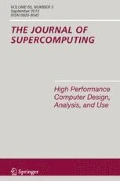Abstract
Multicasting some pieces of information such as messages or packets (called dispatches) from source node(s) to a group of target nodes are governed by a specific sequence in the networked systems. The sequence is called a consensus that indicates an ordering on dispatches to be viewed by the target nodes. Achievement of consensus is a concern in some networked based systems such as distributed ones because the lack of consensus leads to conflict among target nodes reaction. A consensus protocol has some properties to be checked when a source node multicasts a sequence of dispatches to target nodes. The CBCAST protocol is a consensus protocol having properties for ordering and synchronization of dispatches in network communications. This paper thinks of the properties and formulates axioms to check them. The axioms can be practiced for network applications such as group communication and web services. Our approach has two phases consisting of modeling and formulation. The first phase addresses specification of sender and recipient processes by tabular automata. The second phase addresses formulation of axioms using the automaton.










Similar content being viewed by others
References
Babamir SM (2012) Constructing formal rules to verify message communication in distributed systems. J Supercomput 59(3):1396–1418
Babamir SM (2012) Specifying and modeling multicast communication in CBCAST protocol. Proc Rom Acad, Ser A : Math Phys Tech Sci Inf Sci 13(3):261–268
Baldoni R, Raynal M (2002) Fundamentals of distributed computing: a practical tour of vector clock systems. IEEE Distrib Syst, 3
Birman KP (2005) Reliable distributed systems: technologies, Web Services and applications. Springer, Berlin
Chockler GV, Keidar I, Vitenberg R (2001) Group communication specifications: a comprehensive study. ACM Comput Surv 33(4):427–469
Dózsa G, Kumar S, Balaji P, Buntinas D, Goodell D, Gropp W, Ratterman J, Thakur R (2010) Enabling concurrent multithreaded MPI communication on multicore petascale systems. In: Proc of the 17th European MPI users’ group meeting conference on recent advances in the message passing interface, Heidelberg, 2011. Springer, Berlin, pp 11–20
Drusinsky D, Shing M (2007) Verifying distributed protocols using MSC-assertions, run-time monitoring and automatic test generation. In: the 18th IEEE/IFIP international workshop on rapid system prototyping (RSP’07), pp 82–88
Drusinsky D, Shing M, Demir KA (2007) Creating validating embedded assertion statecharts. IEEE Distrib Syst Online 8(5):1–12
Fulmare N, Yadav D (2010) Rigorous analysis of byzantine causal order using event-B. In: Proc of the international conference and workshop on emerging trends in technology, pp 723–726
Kostin A, Ilushechkina L (2010) Modeling and simulation of distributed systems. World Scientific, Singapore
Khanna G, Varadharajan P, Bagchi S (2006) Automated online monitoring of distributed applications through external monitors. IEEE Trans Dependable Secure Comput 3(2):115–129
Kruger IH, Meisinger M, Menarini M (2007) Runtime verification of interactions: from MSCs to aspects. In: Proc. of the 7th international workshop on runtime verification (RV 2007). Lecture notes in computer science, vol 4839. Springer, Berlin, pp 63–74
Kruger IH, Meisinger M, Menarini M (2010) Interaction-based runtime verification for systems of systems integration. J Log Comput 20(3):725–742
Lane RG, Daniels S, Yuan X (2007) An empirical study of reliable multicast protocols over ethernet-connected networks. Journal of Performance Evaluation 64(3):210–228
Lomazova IA (1997) On proving large distributed systems: Petri net modules verification. In: Proceedings of the 4th international conference on parallel computing technologies. Lecture notes in computer science, vol 1277. Springer, Berlin, pp 70–75
Li G, Delisi M, Gopalakrishnan G, Kirby RM (2008) Formal specification of the MPI-2.0 standard in TLA+. In: Proc of the 13th ACM SIGPLAN symposium on principles and practice of parallel programming, pp 283–284
Li G, Palmer R, DeLisi M, Gopalakrishnan G, Kirby RM (2011) Formal specification of MPI 2.0: case study in specifying a practical concurrent programming API. Sci Comput Program 76(2):65–81
Sen K, Vardhan A, Agha G, Rosu G (2004) Efficient decentralized monitoring of safety in distributed systems. In: Proc of 26th international conference on software engineering, pp 418–427
Siegel SF, Gopalakrishnan G (2011) Formal analysis of message passing. In: Proc of the 12th international conference on verification, model checking, and abstract interpretation (VMCAI’11). Springer, Berlin, pp 2–18
Tanenbaum AS, Steen MV (2007) Distributed systems: principles and paradigms. Prentice Hall, New York
Thakur R, Rabenseifner R, Gropp W (2005) Optimization of collective communication operations in MPICH. Int J High Perform Comput Appl 1(19):49–66
Tsaur W, Horng S (2001) Auditing causal relationships of group multicast communications in group-oriented distributed systems. J Supercomput 18:25–45
Tsuchiya T, Schiper A (2011) Verification of consensus algorithms using satisfiability solving. J Parallel Distrib Comput 23:341–358
Yadav D, Butler M (2005) Application of event-B to global causal ordering for fault tolerant transactions. In: Workshop on rigorous engineering of fault tolerant systems (REFT2005), pp 93–102
Zhang F, Qi Z, Guan H, Liu X, Yang M, Zhang Z (2009) FiLM: a runtime monitoring tool for distributed systems. In: the 3rd IEEE international conference on secure software integration and reliability improvement, pp 40–46
Zulkernine M, Seviora RE (2002) A compositional approach to monitoring distributed systems. In: Proc of the international conference on dependable systems and networks, pp 763–772
Acknowledgement
The author is grateful to University of Kashan for supporting this work by grant No. 3055/2.
Author information
Authors and Affiliations
Corresponding author
Appendix: Figure 11
Appendix: Figure 11
Rights and permissions
About this article
Cite this article
Babamir, S.M. Specification and verification of reliability in dispatching multicast messages. J Supercomput 63, 612–635 (2013). https://doi.org/10.1007/s11227-012-0834-2
Published:
Issue Date:
DOI: https://doi.org/10.1007/s11227-012-0834-2





